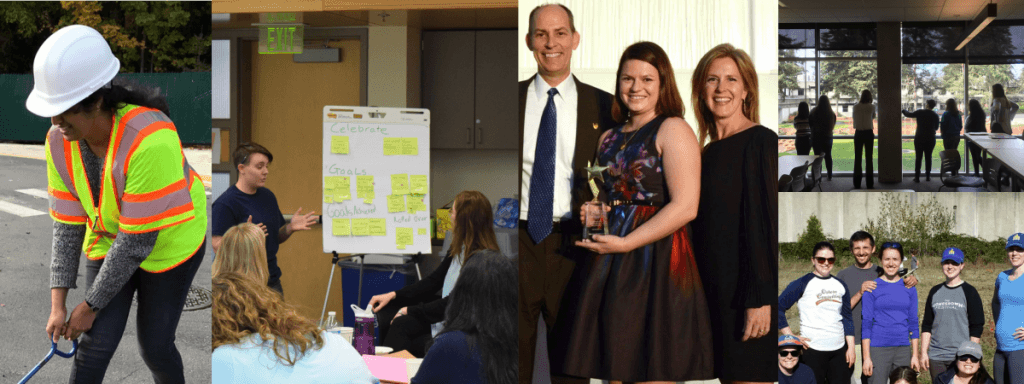
In honor of International Women’s Day, March 8, we collected stories, inspiration, and words of wisdom from Osborn Consulting female engineers who are paving the way in our historically male-dominated industry. Osborn Consulting has developed a truly unique team of highly qualified and collaborative men and women, with over 60% female engineers. These women inspire our team to think creatively and focus on work-life balance, as well as empower those around us. We asked our female engineers about how they advanced to where they are in their careers now, what they encountered along the way, and what advice they would pass on to the next generation – and we discovered even more reasons to be inspired by our incredible team!
Q1: What made you want to go into civil engineering?

- “Ever since I was a young kid I’ve liked taking things apart (clocks, radios, etc.) and making new contraptions. My parents enrolled me in a summer camp in 7th grade where we built water towers and learned some basic principles of engineering. It was from that point that I knew I wanted to be an engineer. It wasn’t until I participated in Engineers Without Borders in college that I discovered I wanted to be a water resources engineer.”
- “I wanted to have a career that involved math, water and environment. I wanted to do work that was creative, but practical too.”
- “My high school physics teacher was a former civil engineer, and a woman. She used real world examples to teach us the basic principles of physics, and made me realize that I could combine my love of math, science, and the outdoors into one profession.”
- “I was always stronger in math and science. Civil engineering was a way for me to capitalize on those skills and work in a field that provides beneficial public infrastructure and protection of natural resources. “
- “I really enjoy having a real-world practical application to use problem solving and math. It is really satisfying to see something that was a concept become infrastructure that is visible, useful, and depended on by our communities every day. I have a strong desire to do what we can to mitigate the effects of urbanization and development on the environment as well as help make positive changes in our watersheds.”
- “Having a positive impact on my community and the infrastructure that we rely on.”
- “Civil engineering attracted me because I can work on improving people’s day to day lives by designing infrastructure that will keep them safe, healthy and productive.”
Q2: What motivates you in your profession?
- “It motivates me every day that water sustains life. We get to see our work built in our community, and even if it’s underground piping, I know it’s making a difference – that’s really fun.”
- “I like helping people. Solving problems using engineering to help improve society is rewarding in itself.”
- “Watching the leadership, professional and technical growth of my team.”
- “My biggest motivation is seeing my work have a positive impact on the community I live in.”
- “Achievements, Responsibility and Compliments.”
- “Coming in every day to work alongside such admirable people that together accomplish more than I would have imagined.”
Q3: What is your favorite part of your job as a civil engineer?
- “Seeing a concept design created by calculations/models be constructed and function in the real world.”
- “Probably the variety, from project to project and also in the variety of daily tasks. There is a learning curve on each new project and I feel like every year is a new building block for my career.”
- “Working with people.”
- “Communicating to the community, elected officials and other stakeholders the need and purpose of planned infrastructure projects to gain their support and endorsement.”
Q4: What has helped you most in advancing your career?
- “The connections I made early in my career through my involvement in ASCE have been invaluable in advancing my career. I was able to take on local and regional leadership roles within ASCE very early in my career, travel all over the United States, and meet some incredibly inspiring role models.”
- “People that believe in me and challenged me to dream bigger than I thought possible.”
- “Learning from colleagues – everyone has a different niche/passion and working with a supportive team is key to development individually.”
- “Great mentors, always being ready to take on challenging work, open-mind towards learning, and involvement in professional organizations.”
- “Working for people who weren’t afraid to put me into stretch roles, and back me up with the resources to succeed.”
Q5: What challenges do women face in your profession?
- “Confidence. Having confidence in an industry that has been dominated by men, knowing that we can assume positions of leadership and have great design ideas.”
- “I think there is an unconscious bias out there that women in the industry will be distracted by family life and less committed to work. I also believe that many women are brought up to be conflict adverse, which is something we have to overcome if we’re going to be good leaders/bosses/managers/negotiators.”
- “Balancing family and career is a big challenge.”
- “Starting out in my career I didn’t encounter many challenges as a women specifically, but once I had a baby there was an almost immediate shift. Past employers weren’t willing to work with me on creating a flexible schedule and it felt as though I was valued as less-than my male counterparts doing the same work. Where I was working there was a clear glass ceiling preventing me from moving forward in my career, especially when having a kid meant reduced work hours.”
Q6: How did you overcome challenges as a women in your profession?
- “Ignore those people who say that you can’t do it. Find allies who are supportive of your dreams and passions. Work hard and push yourself. Persist through failure, criticism, rejection and pressure.”
- “I do, and possibly will always need to, mentally prepare for meetings/interviews/etc. that are higher pressure situations and may include conflict. I have to make sure that I am armed with the knowledge and confidence to be the strong negotiator and/or exceed the expectation of others that I might not be cut out for the task at hand.”
- “It is encouraging seeing other women in our industry already taking on leadership roles in both our company and other engineering societies. They are leading the way and inspiring others. I also couldn’t have been an engineer without the support and encouragement from my family along the way. Nowadays, I focus on building inner confidence and strengthening my understanding in engineering as these tools outperform any negativity that stems from me being a female engineer.”
- “Working at OCI has shown me many ways female engineers can be empowered and equal, even with working around my family’s schedule. Work/life balance is such an important part of OCI’s culture. I didn’t think I’d ever be able to work part-time as a civil engineer, raise my family, and not be completely stressed out or missing out on career advancement. Having a boss with three kids and a flexible schedule and showcases the importance of balancing work and family, which has really turned my perspective around. Sometimes just finding the workplace and mentors that are best suited to you is the best way to overcome these challenges. Keep looking!”
Q7: What advice do you have for young female engineers?
- “Never give up. Believe in yourself. Develop a strong support system – either from your family or other female engineers that can help encourage you along the way.”
- “You can do it! Through civil engineering you’ll find a way to serve your community in a very meaningful way. Find good mentors and pick your supervisors well. Don’t just search to do the work you love, but search to work for a supervisor who you can call a mentor, who inspires you and challenges you to achieve your greatest potential. The difference that will make in your enjoyment of your career will be outstanding.”
- “You have a valued and important role in this profession. Believe in yourself.”
- “Don’t give up! Don’t let other people define the limits to your success and don’t be afraid to reach out and try something new or different.”
- “There are lots of ways for you to make it in this industry with respect to what types of roles you want to take on and what work-life balance looks like to you. Don’t feel like to you have to fully commit to one path right away. Work hard, do a good job, and earn the respect of your industry so you’ll have many doors to choose from.”
Q8: How is OCI’s staff and leadership demographics, with majority female, significant to you?
- “I think having so many female leaders of OCI is important to me because one, it is inspiring, and two, it provides lots of growth opportunities for learning to be a better engineer/leader.”
- “As a part-time working mom, work-life balance is of paramount importance. Having leadership with the same set of priorities for their own work-life balance is unlike anywhere I’ve ever worked. Knowing that you are personally and professionally supported 110% by both leadership and peers makes all the difference in the world.”
- “Because I can work with people who care about the same things I care about, because the leadership recognizes and invests in their most valued resources (their people).”
- “It is such a great culture to be a part of. We are in-tune with our strengths as a team and work collaboratively to grow a successful firm that has a positive impact on the word around us. Leadership at OCI is seen throughout all our employees; we are all role models and mentors for one another and that makes an incredible team community.”
- “OCI’s female leadership is a big reason why we have been able to create a work environment that allows for working parents to work reduced hours without it adversely affecting their career path or quality of our deliverables. This has allowed us to limit turnover so fewer women are leaving the industry. I’ve been pleasantly surprised, time and time again, at how productive and amazing some of our part-time parents are; it really reinforces that you don’t have to spend 50-hrs in the office every week to be successful in this industry.”






